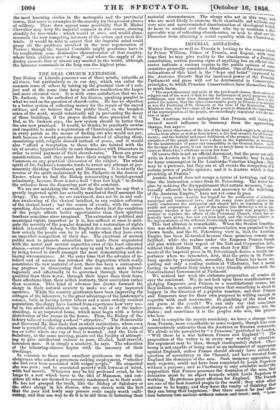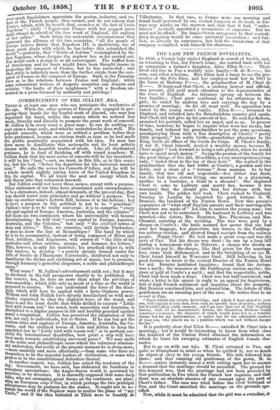IMPERIAL AGITATORS.
WHILE Europe as well as Prussia is looking to the course taken by Prince William, Prince of Prussia, and Regent, with seine hope that he may give reality to the simulacrum of a P constitution, certain passing signs of anything but an official eha: meter indicate a curious caprice in the public opinion of seine countries generally considered Absolutist. One of the most curious intimations of this kind is the "hope and belief" expressed by the Austrian Gazette that the increased power of the Prussia, Parliament and press will not be detrimental to Conservative principles, to which Prussian Conservatives have themselves done so much harm.
"The superciliousness and pride of the privileged classes, their misuse of religion and of the word of God for the furtherance of party purposes, their selfishness, and their utter disregard for justice and equity, hay, so di.; gusted the nation, that the ultra-conservative party in Prussia is as isolated as was the Faubourg of St. Germain at the time of the Restoration. The Ministers also, who have done all in their powerto diminish the importance of the representation of the people, are exceedingly unpopular with the na. tion at large."
g The Austrian writer anticipates that Prussia will derive in- creased moral influence in Germany from the approachin change, but says-
" The strict observance of the law of the land (which ought to be safe from attacks from above as well as from below) is the best security for all Govern- ments.; and the faithful and exact fulfilment of the promise, that the repro- sentataves of the people shall have a share in the legislation, is necessary for the maintenance of peace and tranquillity in the German States. A,s to the freedom of the press, it can never do as much harm to the Conservative cause as Hinkeldey's arbitrary system has done." Of course this is not an official document, but the press can only write in Austria as it is permitted. The remarks may be made for home consumption in the Lombardo-Venetian kingdom ; they may be a pretence, but they are at all events the recognition of a certain power of public opinion; and it is Austria which is thus preaching at Prussia!
Austria herself does not escape a course of lecturing, and this time the instruction comes from St. Petersburg. The writer be- gins by noticing the disappointment that certain measures, "uni- versally allowed to be requisite and necessary to the well-being of the Austrian Empire," have not yet come to pass.
"For many years Austria has longed for the publication of definitive municipal and communal laws, and for many years public opinion has loudly condemned the antiquated and absurd laws or regulations of the guilds and corporations. A part of the nation (the Hebrews) is left in un- certainty whether it has or has not a right to acquire real property; the promise to regulate the affairs of the Protestant Church, which has re- peatedly been given, has not yet been kept, and the statutes relative to the representation of the different Crown lands are still wanting."
This last allusion is remarkable. When the Stadion Constitu- tion was abolished, a certain, representation was promised to the Crown lands, and the St. Petersburg view is, that the Austrian Empire has been ill-treated because these promises remain =- fulfilled ; whil3 the realms under the Emperor Francis Joseph still pine without their repeal of the Test and Corporation Acts, without their Reform Bill, or even their Jew Bill ! These com- ments of the imperial press in St. Petersburgh derive a double im- portance when we remember, first, that the press in St. Peters- burg speaks by permission, secondly, that Russia has beeen ac- quiring not only a coaling station at Villafranea, but a moral footing in northern Italy under a very friendly alliance with the Constitutional Government of Piedmont. We noticed last week the elaborate preparation of armies all over the continent. We do not look upon these manifestations as pledging Emperors and Princes to a constitutional course, but they indicate a certain pervading sense that something is about to happen. in the direction of a popular reaction, and that Princes and Emperors may for their own_purposes be willing enough to coquette with such movements. In gambling of the kind who can guess at the result? We can only say that sometimes princes, who are the smartest sharpers at such games, win the stakes ; and sometimes it is the peoples who win, the princes who lose. And to complete the mystic roundelay, we have a strange yoke from Prussia, more remarkable in some respects, though less even constructively authentic than the Austrian or Russian comments. We allude to the pamphlet by "a Prussian," published in London, "Will there be a war between France and England " ? The proposition of the writer is in every way worthy of attention. His argument may be thus, though inadequately stated. Cher- bourg is not capable of being used as an instrument of aggression against England, unless France should already have solved the question of ascendancy in the Channel, and have wrested from England the dominion of the seas. Such immense apparatus, at such expense, could. not have been completed by Louis Napoleon
without a purpose ; and as Cherbourg is only available under the supposition that France possesses the dominion of the seas, that dominion must be an object towards which Louis Napoleon el..0 working. He professes great affection for England. The French are one of the best hearted people in the world ; they wish other nations to be happy, and they have the vanity of thinking _nee.t they can bring that happiness. But there cannot be re anew. tion between two nations without esteem and trust ; and, " ever much Englishmen appreciate the genius, industry, and va- lour of the French people, they cannot, and do not esteem that France, which, with its mouth shut, crouches at the feet of Louis Napoleon " ; while "Napoleonic France with her gagged press must always be afraid of the free word of England, the asylum of her exiles."Such being the undeniable circumstances that surround the alliance of the two countries, "all the people of Europe believe firmly that Napoleon LII. is meditating one of those great deeds with which he has before this astonished the world "—probably, that "Battle of Actium" contemplated by the first Napoleon, whose designs the nephew has so far carried out. Nor would such a design be at all extravagant. The baffled hero of Strasbourg and its boots might have been thought insane in projecting' the conquest of France, but he has succeeded ; and that stride is infinitely more than the further stride from the con- quest of France to the conquest of Europe. Such is the Prussian view as to the relations between France and England ; while some subservient writers of despotic countries can discern and criticize "the faults of their neighbours" with a freedom un- wonted in a press licensed by authority and privilege !



























 Previous page
Previous page